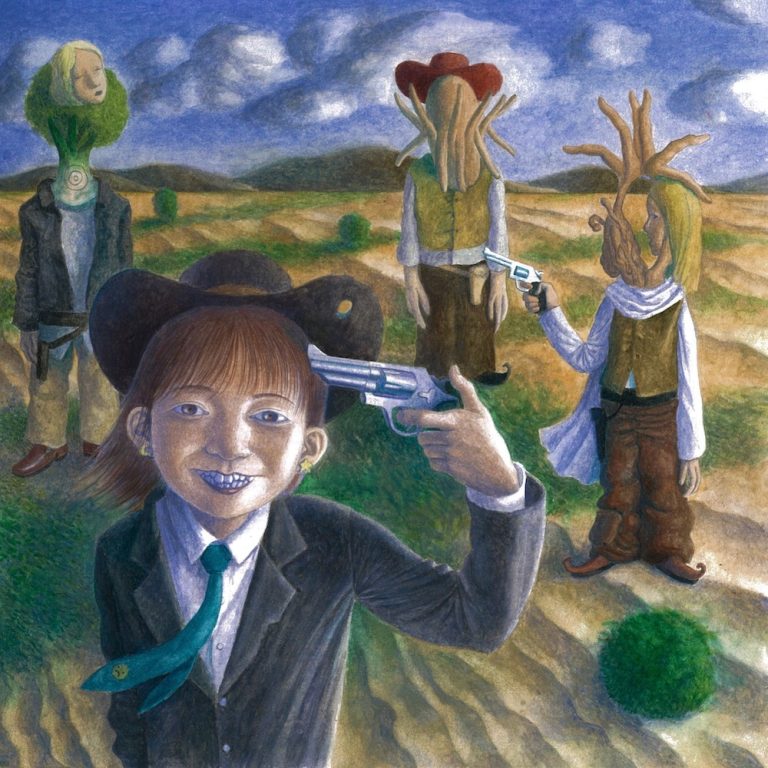Lowertown, with an unapologetic southern States’ twang, plough the rural, small-town aesthetic – despite their Atlanta origins. The duo of Olivia Osby and Avsha Weinberg met in a maths class, bonding over jazz, though their own music would resemble alternative folk. Crooked guitar chords and Osby’s unique delivery, in which rhythm follows poetry, garnered them a dedicated fanbase far beyond the school corridors, and a deal with Dirty Hit was signed prior to graduation. Several excellent EPs followed. There’s an excellent EP in their debut album too, yet the surrounding misjudgments on I Love To Lie result in a record that frustrates and underwhelms.
A full-length debut is a chance to announce oneself; to play with the time and space afforded by the format. It’s odd then that I Love To Lie finds Lowertown straightening their twisted melancholy into conventional song structures and more obvious melodies, largely abandoning the sound that made them. Recorded in England with producer Catherine Marks (Wolf Alice, St. Vincent), there’s a slick tone here, far from their early lo-fi efforts. This decision is intentional, made in the name of ‘progression’, yet it provides anything but. The slow morphing textures of last year’s The Gaping Mouth EP have subsided, with energy and sharp angles in their place. Faster tempos frequently restrain Osby’s exploratory delivery, and her voice ricochets bluntly off scattergun guitars.
This misuse of vocals, an early Lowertown hallmark, is a constant theme. The upbeat “I’m Not” is the first indication of this, with its tight slung guitars and rapid surges between vocal lines. These lines feel rushed and are pitched surprisingly low, eventually descending into a pedestrian singalong. Even on the musically fantastic “No Way” – a spiky post-punk landscape constructed out of funky guitar tremolos – Osby’s performance feels stunted by rigidity, unable to glide and roam freely. It makes for a messy combination. As with so many songs on this album, it isn’t bad, it’s just that the potential is so much greater.
Elsewhere Osby takes a step back, allowing Weinberg to take the lead vocals. Maybe this is in recognition of Osby’s incongruous approach, though ultimately Weinberg’s frail voice adds little to an increasingly predictable, repetitive tune. “At The End” is a song that relies on heavy dissonance, a shock factor of diminishing returns that by the three-minute mark has long since run its course.
Closing track “It’s Easy For Me” is, ironically, the epitome of the album’s vocal struggles. It’s a gloriously evocative solo guitar piece, glistening with nostalgia and the scent of twilit summer meadows. A more perfect backdrop for Osby’s bittersweet vocal fry there could never be. And yet it never arrives; the song remains an instrumental. Again, the track is a wonderfully composed standalone piece. For Lowertown though, this feels like a glaring missed opportunity.
The record is made all the more frustrating by the points at which Lowertown get it right. “Antibiotics” is an excellent example of this, with its late evening mellifluence and stark medical references. The distorted chord sequence of “Goon”, too, lays the foundation for Osby’s voice to float over, at times as a delicate whisper, as moments of fingerpicked arpeggios break through and rise to the fore, unearthing strangeness. Osby’s striking lyricism deserves to be heard and “Goon” is a rare example of the music allowing it to take precedence, imbuing evocative lines like “everything I say twists your young face into a scowl / every little part of me only seems to let you down” with power.
Following track ‘Waltz in A♭’ is another instance in which the record excels. Essentially a piano ballad, the duo here strip back the Lowertown sound to its very essence: sad, haunting chords and rhythmically irregular melodies. Osby regales with the tale of the “kaleidoscope man” and the poetry is able to come through, unobscured by rigorous drumming or angsty guitar thrashes. Making the most of Weinberg’s classical piano training, it still pushes their sound in a new direction (toward the ballad) while retaining the rare melodic beauty of earlier material.
Lowertown are in possession of a delicate talent, one that they themselves appear to be – if not unaware of – unsure how to utilise. This is not a bad album by any standard, however, the abundance of unfulfilled potential overshadows its better moments, making for a frustrating experience. “I’m not crazy for wanting more,” sings Osby at one point. Listening to the sparse high points of I Love To Lie, it’s easy to agree.

